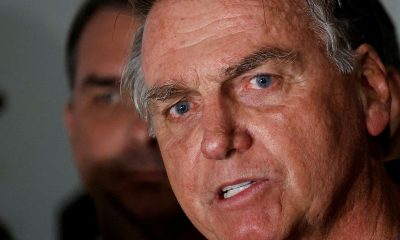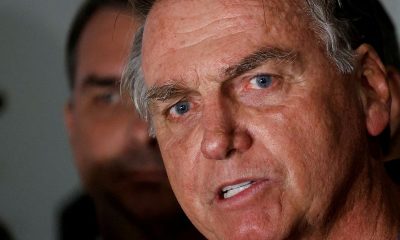Economy
Boyden Research Shows Threat of Recession and Employee Burnout Top Risks for Global Business
New York, June 22, 2023 (GLOBE NEWSWIRE) — Boyden, a premier global leadership and talent advisory firm, reports on its annual global executive talent research. Macro-economic challenges, innovation in AI, and rising concerns over talent are recalibrating leadership capabilities and forging a closer relationship between boards and the executive. Boyden’s global study, Exploring Adaptivity through Strategy and Talent, discovers perspectives on risk among CEOs, boards and other senior leaders, alongside executive talent trends, priorities and investment. Findings show the top external risk to business is threat of recession, cited by 38 percent of respondents, while the top internal risk is employee burnout, cited by 24 percent, tying with rising business costs. For growth prospects, 77 percent of global leaders are very confident or confident in their organisation’s growth potential. However, 41 percent say their organisations need to strengthen skills in AI, robotics and machine learning to achieve growth, while 35 percent have little or no confidence in having the right talent to align with strategy. Board-level respondents see ‘human capital’ as the top driver of organisational growth, tying with ‘innovation’; 44 percent say they need to strengthen their own skills in AI, robotics and machine learning. In preparing for recession, 33 percent of board respondents report increased engagement by the leadership team with the board. “Our research shows a closer relationship between the executive and the board, reflected in our own executive search and leadership consulting engagements,” says Kathleen Dunton, Chair, Board of Directors, Boyden. “While overseeing strategy and representing shareholders, board respondents reveal a strong operational focus both for their own skill sets and the needs of the business, most notably human capital and digital skills.””The board-level focus on talent is an on-going reflection of the deeper engagement of the board in day-to-day business as leaders and organisations strive to adapt in real time,” comments Chad Hesters, President & CEO, Boyden. “Coupled with this, digital capabilities and strategy have become intertwined, accelerating the pace of change, and shining a light on the need for digital fluency at all levels of the organisation”. The need for adaptivity is driving organisations to recalibrate their approach to leadership, away from traditional competitive styles to a more nuanced approach. Rikard Scoufias, Chair, Hellenic Hydrocarbons and Energy Resources Management Company (HEREMA S.A.) explains, “What is making this period so exciting for CEOs is that leadership today is not just dependent on having huge financial resources, it’s really about mindset. By adopting more creative and competitive mindsets and articulating more attractive stakeholder value propositions the playing field is levelled out and organisations can steal business and market share. It’s completely different to competing on ‘traditional’ parameters.”About the researchThis research was conducted in Q2 2023 among senior executives worldwide from different industries, with more than 1,000 responses from board directors, CEOs, senior vice presidents, division/country heads and functional leaders. Regional representation is:Europe 39 percent | North America 24 percent | Asia/Pacific 20 percent | South America 11 percent | Africa/Middle East 6 percent About BoydenBoyden is a premier leadership and talent advisory firm with more than 70 offices in over 45 countries. Our global reach enables us to serve client needs anywhere they conduct business. We connect great companies with great leaders through executive search, interim management and leadership consulting solutions. Boyden is ranked amongst the top companies on Forbes’ Americas Best Executive Recruiting Firms for 2023. For further information, visit www.boyden.com.
Exploring Adaptivity through Strategy
Chris Swee
Boyden
cswee@boyden.com
Joanna Goncalves
Boyden
jgoncalves@boyden.com
Economy
Russian central bank says it needs months to make sure CPI falling before rate cuts -RBC


© Reuters. Russian Central Bank Governor Elvira Nabiullina attends a news conference in Moscow, Russia June 14, 2019. REUTERS/Shamil Zhumatov/File Photo
MOSCOW (Reuters) – Russia’s central bank will need two to three months to make sure that inflation is steadily declining before taking any decision on interest rate cuts, the bank’s governor Elvira Nabiullina told RBC media on Sunday.
The central bank raised its key interest rate by 100 basis points to 16% earlier in December, hiking for the fifth consecutive meeting in response to stubborn inflation, and suggested that its tightening cycle was nearly over.
Nabiullina said it was not yet clear when exactly the regulator would start cutting rates, however.
“We really need to make sure that inflation is steadily decreasing, that these are not one-off factors that can affect the rate of price growth in a particular month,” she said.
Nabiullina said the bank was taking into account a wide range of indicators but primarily those that “characterize the stability of inflation”.
“This will take two or three months or more – it depends on how much the wide range of indicators that characterize sustainable inflation declines,” she said.
The bank will next convene to set its benchmark rate on Feb. 16.
The governor also said the bank should have started monetary policy tightening earlier than in July, when it embarked on the rate-hiking cycle.
Economy
China identifies second set of projects in $140 billion spending plan


© Reuters. FILE PHOTO: Workers walk past an under-construction area with completed office towers in the background, in Shenzhen’s Qianhai new district, Guangdong province, China August 25, 2023. REUTERS/David Kirton/File Photo
SHANGHAI (Reuters) – China’s top planning body said on Saturday it had identified a second batch of public investment projects, including flood control and disaster relief programmes, under a bond issuance and investment plan announced in October to boost the economy.
With the latest tranche, China has now earmarked more than 800 billion yuan of its 1 trillion yuan ($140 billion) in additional government bond issuance in the fourth quarter, as it focuses on fiscal steps to shore up the flagging economy.
The National Development and Reform Commission (NDRC) said in a statement on Saturday it had identified 9,600 projects with planned investment of more than 560 billion yuan.
China’s economy, the world’s second largest, is struggling to regain its footing post-COVID-19 as policymakers grapple with tepid consumer demand, weak exports, falling foreign investment and a deepening real estate crisis.
The 1 trillion yuan in additional bond issuance will widen China’s 2023 budget deficit ratio to around 3.8 percent from 3 percent, the state-run Xinhua news agency has said.
“Construction of the projects will improve China’s flood control system, emergency response mechanism and disaster relief capabilities, and better protect people’s lives and property, so it is very significant,” the NDRC said.
The agency said it will coordinate with other government bodies to make sure that funds are allocated speedily for investment and that high standards of quality are maintained in project construction.
($1 = 7.1315 renminbi)
Economy
Russian central bank says it needs months to make sure CPI falling before rate cuts -RBC


© Reuters. Russian Central Bank Governor Elvira Nabiullina attends a news conference in Moscow, Russia June 14, 2019. REUTERS/Shamil Zhumatov/File Photo
MOSCOW (Reuters) – Russia’s central bank will need two to three months to make sure that inflation is steadily declining before taking any decision on interest rate cuts, the bank’s governor Elvira Nabiullina told RBC media on Sunday.
The central bank raised its key interest rate by 100 basis points to 16% earlier in December, hiking for the fifth consecutive meeting in response to stubborn inflation, and suggested that its tightening cycle was nearly over.
Nabiullina said it was not yet clear when exactly the regulator would start cutting rates, however.
“We really need to make sure that inflation is steadily decreasing, that these are not one-off factors that can affect the rate of price growth in a particular month,” she said.
Nabiullina said the bank was taking into account a wide range of indicators but primarily those that “characterize the stability of inflation”.
“This will take two or three months or more – it depends on how much the wide range of indicators that characterize sustainable inflation declines,” she said.
The bank will next convene to set its benchmark rate on Feb. 16.
The governor also said the bank should have started monetary policy tightening earlier than in July, when it embarked on the rate-hiking cycle.

 Forex3 years ago
Forex3 years agoForex Today: the dollar is gaining strength amid gloomy sentiment at the start of the Fed’s week

 Forex3 years ago
Forex3 years agoUnbiased review of Pocket Option broker

 Forex3 years ago
Forex3 years agoDollar to pound sterling exchange rate today: Pound plummeted to its lowest since 1985

 Forex3 years ago
Forex3 years agoHow is the Australian dollar doing today?

 Cryptocurrency3 years ago
Cryptocurrency3 years agoWhat happened in the crypto market – current events today

 World3 years ago
World3 years agoWhy are modern video games an art form?

 Commodities3 years ago
Commodities3 years agoCopper continues to fall in price on expectations of lower demand in China

 Economy3 years ago
Economy3 years agoCrude oil tankers double in price due to EU anti-Russian sanctions

























